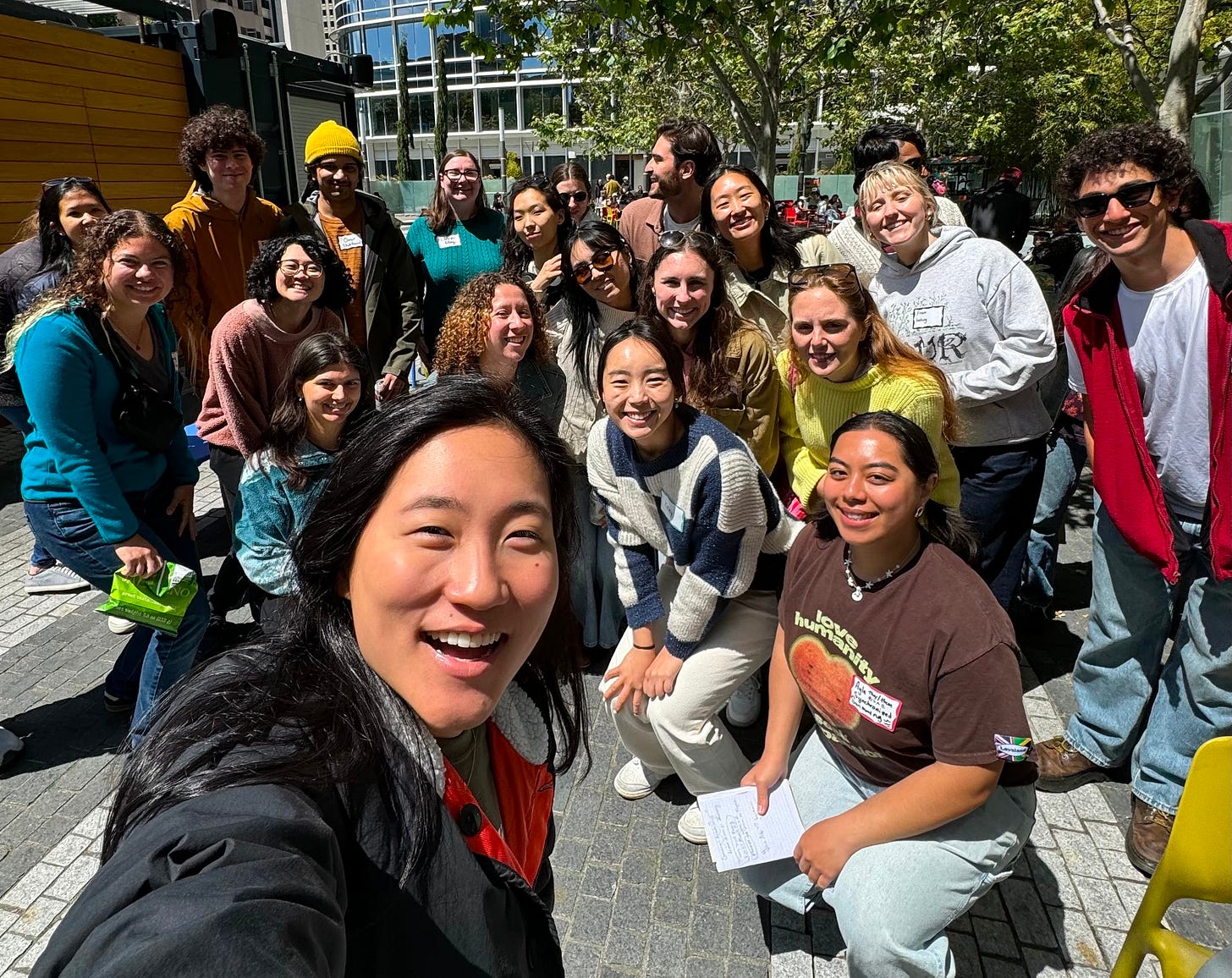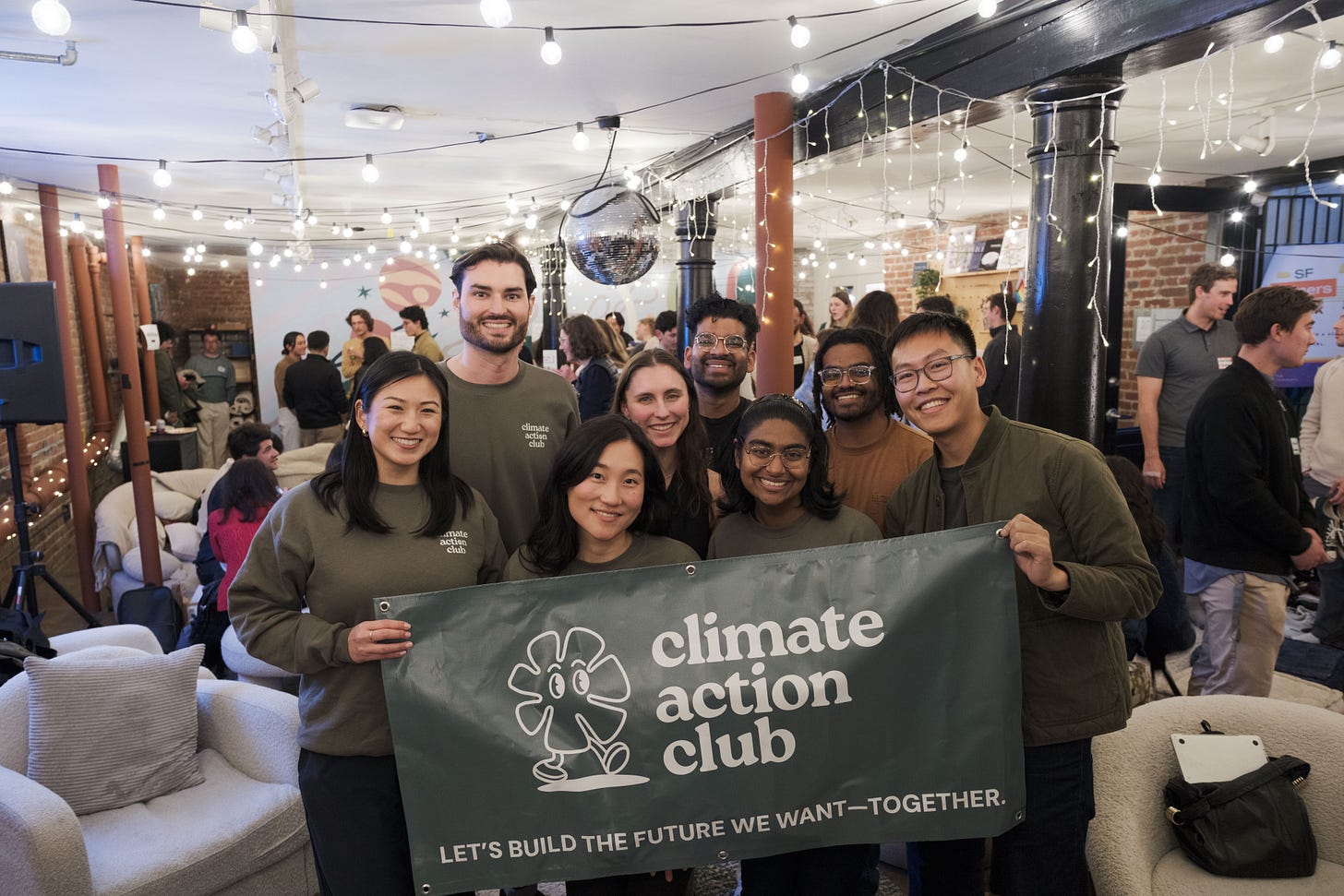Loneliness, Power, and the Climate Movement We Actually Need
Plus some exciting events we're hosting in June!
At our Climate Action Club launch event in April, one of our guest speakers David Jay made a distinction that’s been sitting with me ever since:
Social isolation is the absence of connection. Loneliness is the felt experience of being disconnected, even when you’re surrounded by people.
That hit me hard. Because as embarrassing as it may be to admit, I’ve felt that kind of loneliness for much of my adult life.
For years, I overcommitted to work and school. I (heavily) underinvested in relationships. And it wrecked my mental health, my sense of belonging, and my hope for the future.
Reading Relationality at the start of the year made me feel deeply seen. Not just as a person navigating disconnection, but as someone trying to make sense of how the systems around me were shaping that experience.
Here’s one quote that stopped me in my tracks:
“It’s tempting to see loneliness as a personal feeling. But that is not why we are lonely. We are lonely because the vast engines of cultural, economic, technical, and political power charged with building environments for connection have lost sight of what a relationship is.”
Let’s talk about one of those engines: social media.
You might remember the Facebook whistleblower revealing that Instagram was making teen girls feel worse about their bodies. Behind that was a metric Facebook used to gauge “connection” called Meaningful Social Interactions (MSI) - which prioritized content that triggered strong emotional reactions.
Sounds good, in theory. The assumption was that emotional intensity would drive relationships. But in practice, this meant that the algorithm would favor content that sparked outrage, creating platforms of highly polarizing content, devoid of genuine relationship.
When tech platforms try to engineer relationships through algorithms - without ever being changed by the people they claim to serve - we end up with a version of connection that’s performative, extractive, and incredibly isolating.
That’s not just a design flaw. It’s a cultural failure.
Now this is depressing. Is there another way?
In Relationality, David shares a thought-provoking example from political organizing that gives me hope: deep canvassing.
Instead of flooding people with targeted ads or texts, deep canvassing invites people into nonjudgmental conversations grounded in honesty and mutual listening. It’s slow, human work. But it’s been proven - through randomized controlled trials - to be radically effective at building trust and shifting beliefs.
This was core to Stacey Abrams’ voter turnout work in Georgia, which helped drive a 10% increase in youth turnout in 2020.
Meanwhile, political campaigns spent over $10 billion on ads and texts that research shows barely moved the needle - and may have even made people less likely to vote.
Why? Because most institutions remain obsessed with predictability, not relational power.
They want outcomes they can measure and control. But relationships don’t work that way. They evolve. They surprise us. And they change everyone involved.
So here are some takeaways I’ve been sitting with since reading this book:
We need more gatherers: people building spaces where others can show up regularly, not as LinkedIn profiles or resumes, but as full humans.
We need to unlearn the curse of transactionality: the belief that everything we do together has to produce a defined outcome, or else it isn’t “worth it”.
We need more climate communities that don’t just mobilize, but connect. Spaces where new people feel genuinely welcome. Where the goal isn’t just to fundraise or organize, but to build deep, meaningful relationships with likeminded folks looking to row in the same direction together.
At Climate Action Club, that’s what we’re trying to build.
And while things are constantly changing and evolving, the community is already full of people who want to show up differently - to this work, to each other, and to themselves.
If any of this resonates, come find us at our lecture with David Jay on Tuesday 6/10 (more info below) or in our virtual community! There’s room for you here.
Danielle
Founder, Climate Action Club
Upcoming Events
👕 Community Event: Clothing Swap
Saturday, June 7 | 1PM–4PM | Golden Gate Park
Join us for a clothing swap in the park! Bring any clothes and accessories you are ready to part with and go home with new cute finds!
🔗 RSVP via Slack! Get access to all of our community events by joining the Climate Action Club Slack channel. Sign up here.
📖 Community Event: Book Club - Relationality
Sunday, June 8 | 2PM–4PM | Dolores Park
Let’s discuss Relationality by friend and advisor to Climate Action Club, David Jay! Whether you read the book from cover to cover or just the first chapter, join us to discuss why transformational relationships are so important.
🔗 RSVP via Slack! Get access to all of our community events by joining the Climate Action Club Slack channel. Sign up here.
🥃 On the Rocks: Climate Talks - The Loneliness Epidemic and The Climate Crisis
Tuesday, June 10 | 6PM–8PM | The Sycamore in the Mission, SF
For our first talk, we’re excited to welcome David Jay, author of “Relationality” for a discussion about the entangled causes of the loneliness and climate crises. We’ll explore how disconnection from one another and the natural world drives the climate crisis, and how a climate movement built on connection can be a powerful force for systemic change.
🔗 RSVP Here!
Job Board
Policy Analyst, Electrification at Energy Innovation ($80,000-$90,000, SF/DC)
Account Executive at Greenplaces ($200,000-$240,000, SF/NYC/Raleigh)
Brand Design Lead at Watershed (SF/NYC)
Platform Engineering Manager at Watershed (NYC)
Senior Software Engineer, Managed AI at Crusoe ($183,000-$210,000, SF)
Regulatory and Market Affairs Manager at Pattern Energy ($103,000-$139,000, SF/Houston)
Business Operations Associate at Standard Fleet (SF)





